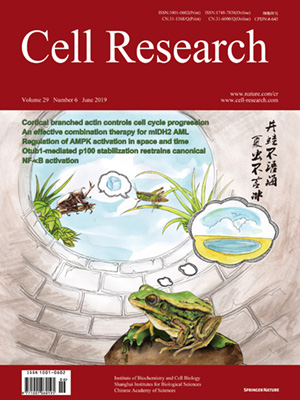
Volume 29, No 6, Jun 2019
ISSN: 1001-0602
EISSN: 1748-7838 2018
impact factor 17.848*
(Clarivate Analytics, 2019)
Volume 29 Issue 6, June 2019: 446-459
ORIGINAL ARTICLES
Vulnerabilities in mIDH2 AML confer sensitivity to APL-like targeted combination therapy
Vera Mugoni1 , Riccardo Panella1 , Giulia Cheloni1 , Ming Chen1 , Olga Pozdnyakova2 , Dina Stroopinsky3 , Jlenia Guarnerio1 ,Emanuele Monteleone 1,4, Jonathan David Lee1 , Lourdes Mendez1, Archita Venugopal Menon1, Jon Christopher Aster5,
Andrew A. Lane2, Richard Maury Stone5, Ilene Galinsky5 , José Cervera Zamora6, Francesco Lo-Coco 7,8, Manoj Kumar Bhasin9,David Avigan3, Letizia Longo1, John Gerard Clohessy 1,10 and Pier Paolo Pandolfi 1
1 Cancer Research Institute, Beth Israel Deaconess Cancer Center; Department of Medicine and Pathology, Beth Israel Deaconess Medical Center, Harvard Medical School, Boston,MA, USA; Ludwig Center at Harvard, Harvard Medical School, Boston, MA, USA; 2Department of Pathology, Brigham and Women’s Hospital, Harvard Medical School, Boston, MA,USA; 3Division of Hematology and Hematologic Malignancies, Department of Medicine, Beth Israel Deaconess Cancer Center, Beth Israel Deaconess Medical Center, Harvard Medical School, Boston, MA, USA; 4Molecular Biotechnology Center and Department of Molecular Biotechnology and Health Sciences, University of Turin, Via Nizza 52, 10126 Turin, Italy; 5Department of Medical Oncology, Dana-Farber Cancer Institute, Harvard Medical School, Boston, MA, USA; 6Biobanco La Fe - Instituto de Investigation Sanitaria La Fe(IIS-LA FE), Avda. de Fernando Abril Martorell 106, 46026 Valencia, Spain; 7Department of Biomedicine and Prevention, University of Rome “Tor Vergata”, Rome, Italy; 8NeuroOncohematology Unit, Santa Lucia Foundation, Rome, Italy; 9Division of IMBIO, Department of Medicine, BIDMC Genomics, Proteomics, Bioinformatics and Systems Biology
Center, Harvard Medical School and Beth Israel Deaconess Medical Center, Boston, MA, USA and 10Preclinical Murine Pharmacogenetics Core, Beth Israel Deaconess Cancer Center, Dana Farber/Harvard Cancer Center, Boston, USA
Correspondence: Pier Paolo Pandolfi (ppandolf@bidmc.harvard.edu)These authors contributed equally: Riccardo Panella, Giulia Cheloni, Ming Chen
Although targeted therapies have proven effective and even curative in human leukaemia, resistance often ensues. IDH enzymes are mutated in ~20% of human AML, with targeted therapies under clinical evaluation. We here characterize leukaemia evolution from mutant IDH2 (mIDH2)-dependence to independence identifying key targetable vulnerabilities of mIDH2 leukaemia that are retained during evolution and progression from early to late stages. Mechanistically, we find that mIDH2 leukaemia are metastable and vulnerable at two distinct levels. On the one hand, they are characterized by oxidative and genotoxic stress, in spite of increased 1-carbon metabolism and glutathione levels. On the other hand, mIDH2 leukaemia display inhibition of LSD1 and a resulting transcriptional signature of all-trans retinoic acid (ATRA) sensitization, in spite of a state of suppressed ATRA signalling due to increased levels of PIN1. We further identify GSH/ROS and PIN1/LSD1 as critical nodes for leukaemia maintenance and the combination of ATRA and arsenic trioxide (ATO) as a key therapeutic modality to target these vulnerabilities. Strikingly, we demonstrate that the combination of ATRA and ATO proves to be a powerfully synergistic and effective therapy in a number of mouse and human mIDH1/2 leukemic models. Thus, our findings pave the way towards the treatment of a sizable fraction of human AMLs through targeted APL-like combinatorial therapies.
https://doi.org/10.1038/s41422-019-0162-7
FULL TEXT | PDF
Browse 1362


